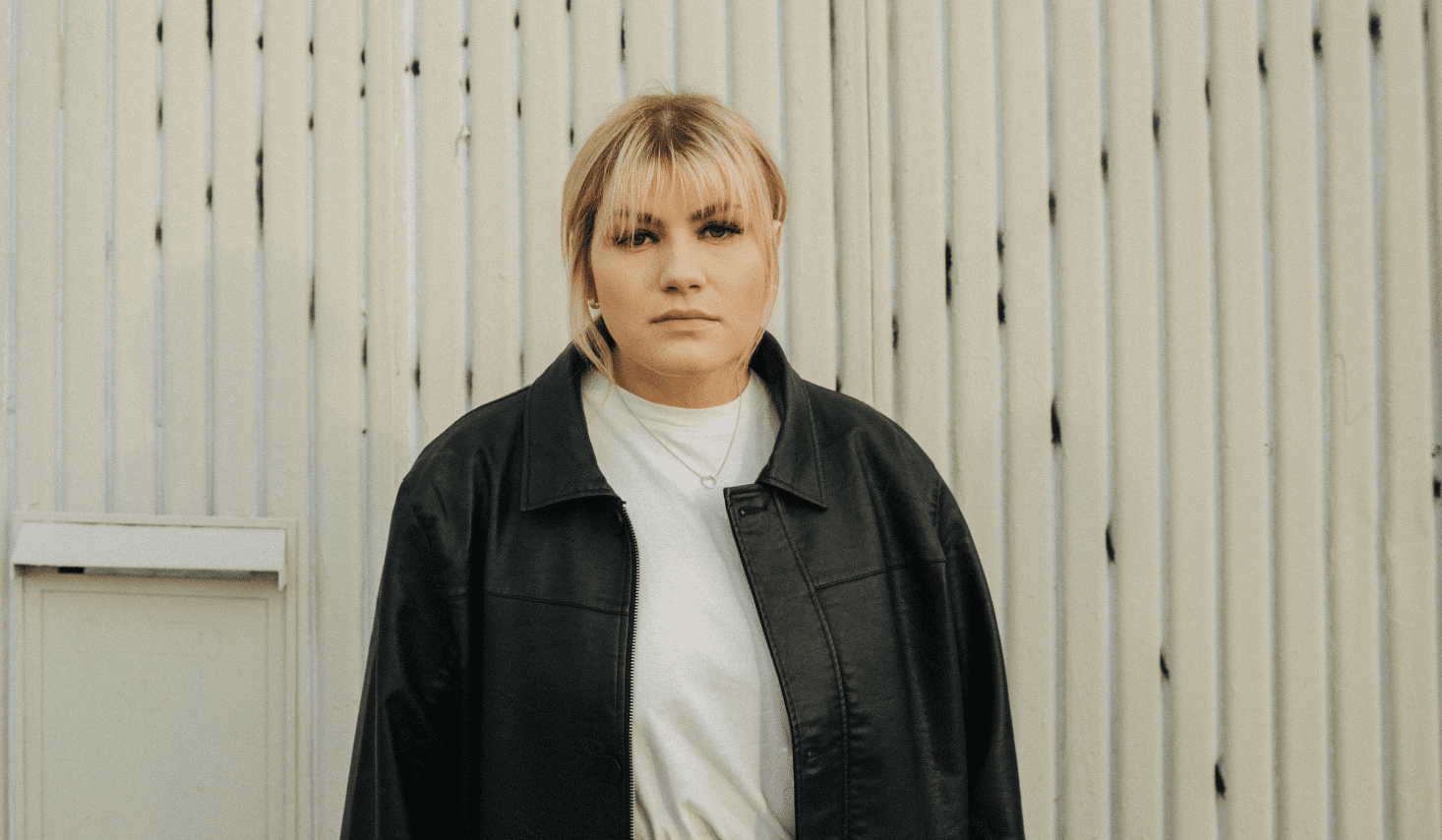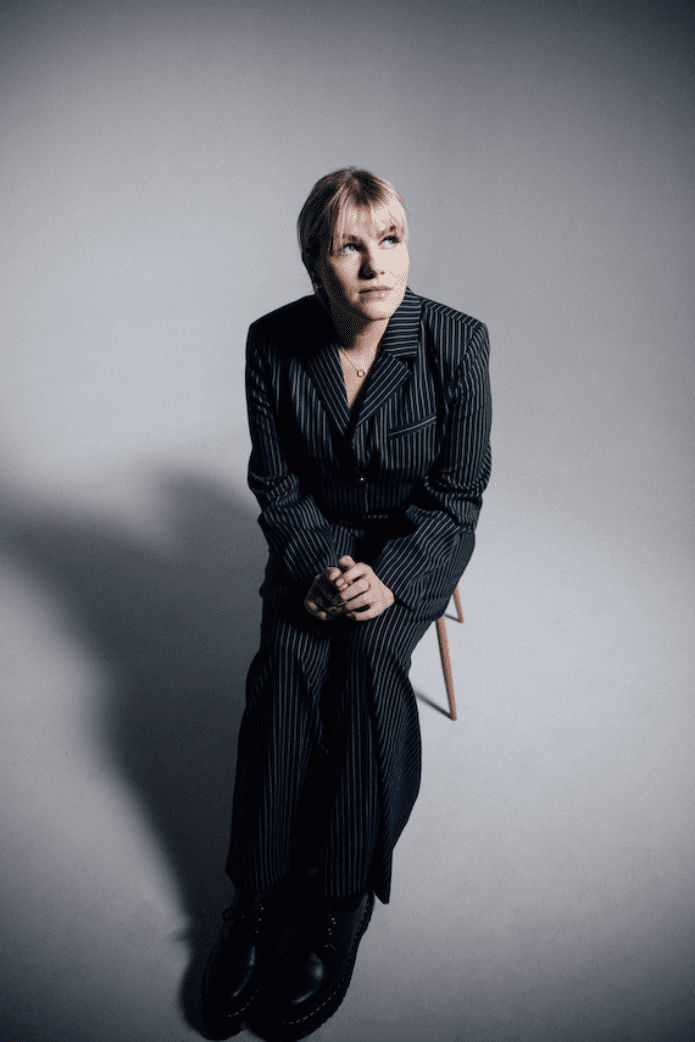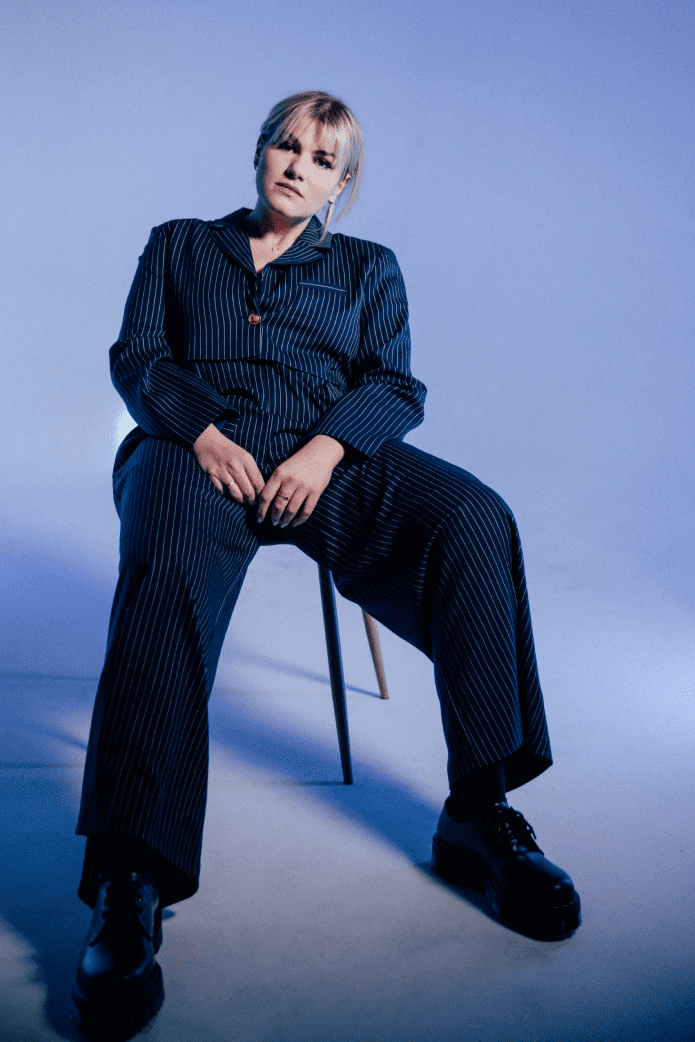
It’s been a fever-dream weekend for Maddie Zahm. Just days ago the fast-rising musician opened for P!nk at Hyde Park. Now, away from the mania of the stage, Zahm is settled in Sony’s London offices and is soaking in the moment. “It was the craziest weekend! We had so much fun and P!nk is a mad woman. That’s going to be something I’m going be thinking about for a really, really long time,” she laughs.
Zahm’s graduation from American Idol contestant to a one-to-watch artist has been no easy feat. Growing up in Idaho, the Gen Z singer-songwriter fell in line with a Christian community and was appointed as a church leader at 13. Her debut EP, You Might Not Like Her is a five-track focus of Zahm’s intimate, purposeful pop therapy. An anecdotal capsule of the 25-year-old’s relationship with religion, body image and identity — the collection of songs places Zahm in Phoebe Bridgers-meets-Ethel Cain territory as the singer’s vocals are brought into central focus, backed against swelling string arrangements, in weighty ballads that simmer in trauma and truth-telling. So, it’s no surprise that her viral TikTok emotive anthem ‘Fat Funny Friend’ catapulted her into the arena of must-watch artists.
Now, on the other side, Zahm is continuing the motions of self-discovery. The artist’s latest project Now That I’ve Been Honest is not only her debut full-length project but a proposition to take control of her own story. Coming out and coming undone, Zahm’s debut record retraces her journey from amateur artist to authentically independent musician.
In the latest instalment of our new music editorial series, Queer & Now, we caught up with Zahm to chat about her debut album, coming up on social media, and figuring out new career highs.
Maddie! You’ve just played Hyde Park and supported P!nk who’s an icon. What was that milestone like for you?
It was special because I was kicked off of American Idol five years ago because I forgot the words to P!nk’s ‘What About Us’ so it was one of those full circle moments. It’s really funny because I looked back and found a video of it and I’m really glad that I didn’t want to be a musician at that point because I had a lot of work to do, but I’m very grateful that I got it.
‘Fat Funny Friend’ blew up on TikTok. It’s a pivotal song on your debut EP. Where did that track come from?
Since ‘Fat Funny Friend’, I’ve lost about 150 pounds and about halfway through that journey, I started experiencing life through the lens of a non-plus-sized body. So, seeing the difference in how people treat me now versus how they did is astronomically different. On the day I wrote it, I got something changed in my car and I remember a man offering to help me. Normally, coming from that experience, you’d be grateful, but I remember sitting in my car and sobbing. I realised that probably had I not lost that weight it would have been a different experience. I went home extremely frustrated and said ‘I’m fucking tired of being the fat funny friend’ and it turned into that song. It ended up taking off in a way that I was not expecting.
‘You Might Not Like Her’ is another track of yours that has gained traction. What inspired that song?
Honestly, I didn’t really want to write that song. ‘You Might Not Like Her’ is the least I’ve ever thought about a song while writing it. It was venting, Even musically, I don’t even think the structure of the verse makes a tonne of sense, because I wrote on a piece of paper and then sang what I wrote and just made it work. I was writing it mainly for myself. I remember sitting with my friend, who I wrote it with thinking, ‘This is never gonna fucking release.’ I was never planning to come out. I also didn’t think that I was queer, even when I wrote it, which is so funny to me – that’s the most gay experience! All the evidence was really stacked against me. It all felt too honest and too specific.
Your music is self-referential and pulls on a lot of personal experiences. How do you creatively work around that?
It’s interesting explaining why art is so exhausting. Some of the best stuff that I want to put on my project genuinely terrifies me. I have to make sure that my ducks are in a row before I release those songs into the world. Looking back at like ‘You Might Not Like Her’ and ‘Fat Funny Friend’, I don’t think I fully processed those [experiences] before I released them. I’m writing so specifically about my life, which means I’m probably never going to reach a conclusion – I’m growing, I’m learning. With this album, it’s fucking messy. It’s very dramatic because it’s my life and so I’m accepting it’s never going to be polished because I’m not.


At what moment have you felt a strong feeling of pride about your music?
In the ‘You Might Not Like Her’ music video, we were casting a man and a woman to play my on-screen parents because my coming out was very chaotic. For my parents, it was really difficult because we were so close. Growing up, they knew everything about me and this was the first time I kept a secret from them. It came across, to me, like they were saying ‘No, you’re not’ but what they were trying to say is ‘How did we miss this?’ My dad, when we were filming, asked if he could play himself in the music video to have a chance to respond the way he wish he had in the moment. So, it was a one-take moment in the ‘You Might Not Like Her’ video of me coming out to my parents. That was me, for the first time, telling my parents I’m gay so that reaction was really real.
From tour to new music, what’s your favourite music memory?
One of the first love songs that I wrote about a girl. I remember writing it and listening to it thinking the songs I’m writing about girls are worlds better than the songs that I was writing about boys! I remember that moment of being able to write about someone that I actually liked.
You’ve begun peeling back the layers of what else we can expect from you. What else do you have in the works?
I wrote an album called ‘Now That I’ve Been Honest‘. I feel like I’ve set the foundation of these core people that are dealing with religious trauma, body things and queerness. It’s a community of really close people that mean a lot and during this last tour, I was connecting with them so deeply. But, I feel like we’re eight months behind. They were listening to ‘If It’s Not God’ or ‘You Might Not Like Her’ and shuffling through those things. I’ve had a year of my life since releasing the EP and so this body of work of what’s been going on now.
From my first experience dating someone who’s closeted to my first experience of dealing with mental health – it’s all literally in chronological order from the moment that I dropped the EP. It feels like I need to catch my friends up on what’s happening and this journal entry of 12 songs does that. It starts with a song that sounds a lot like the EP called ‘Where Do All The Good Kids Go?’ and then it goes into the first love song that I wrote about a girl.
You’ve outlined the album flows chronologically. Did you consider presenting a different timeline for the album?
I was writing with such deep conviction because I was going through high school and college, having a new identity, dating for the first time in a matter of a year.
When we first started talking about an album, I didn’t know how to make one but then it all fell together. I realised there was no other way than to tell the story of what I’ve been doing and the songs just fell into place.
Processing your identity mentally and living your life is so different…
I remember talking to my queer friends before I came out and they would tell me about certain scenarios and I thought, ‘Oh, interesting’, and then I went through the same shit — it hits so different!
You’ve had quite the upward journey as an artist. You appeared on the first season of American Idol and now you’re an proudly independent artist. How do you feel about your career trajectory?
When I was on American Idol, I’ll be completely honest, I didn’t want to be an artist – I was skipping school. On that show, I was known as the Christian worshipper and plus-sized contestant and that was the character that they created. It’s interesting having that as a timestamp to look back on and understand why the EP was so jarring for me. It’s a snapshot of the person that I was and the shit that I had to go through to get to where I am now.
American Idol does not prepare people for the actual industry because it is just so different. And are they going to hate me for saying that? Yeah, but I stand by it. A lot of being an artist is self-reflection and sitting in the quiet and using the introspective time to create art that you feel. You make it through if you have either a sob story or star power and both of those things, in their mind, can’t align. So, that allowed me to go on the show but also didn’t allow them to see me as somebody that could win.
Without the competition show, you’ve made quite a name for yourself. Your new single, ‘Where Do All The Good Kids Go?’ is out now. What does that song mean to you?
‘Where Do All The Good Kids Go?’ bridges the gap from EP to the album. When I was first told that I was going to be working on an album, it was important that I don’t go from this really intentional EP to a pop sound. It would be really jarring for my listeners to go from ‘If It’s Not God’ to really gay pop anthems so the best way was to use the same format that I did with the EP and produce it in a very piano-driven and vocal-driven way.
It starts out with talking about my religious trauma and it’s about realising that this last year has been me catching up on life that I was not allowed to live, which is my authentic truth. Even if it was messy and chaotic and I made every mistake in the book, I couldn’t imagine it going any differently. So, I wanted to pose that question of ‘where do the good kids go?’ and tell you exactly where I went for a year, and it felt perfect.
You’re now on the other side of creating your debut full-length project. How are you feeling about it?
I feel blessed that I have the opportunity to create a piece of art that isn’t as painful as the EP. There’s so much joy in it and I’m feeling excited about the prospect of being able to talk about universal concepts that aren’t so painful to talk about. I’m feeling relief, not because I don’t love the EP, but because it’s heavy. We’re not supposed to feel that heaviness forever. That’s a state that we are not meant to stay in it. There’s beauty in this next chapter and you slowly get to hear me find joy.
Zahm’s debut album Now That I’ve Been Honest is out 20 October via Dollgirl and AWAL recordings.